NJW&C 11: A Bond That Exists Only In Combat

Hey, Kids! It’s Nice Jewish Words & Comics!, the latest installment from Neil Kleid's monthly newsletter with updates and info about his latest projects!
Howdy friends, and happy belated Purim to my fellow Hebros and Hebrettes.
Hope your March has been one of peace and productivity. This is typically the time of year where things ramp up at the ol’ Kleid homestead as we barrel toward Passover, the end of the school year and the start of summer camp. But even still, the writing machine manages to roll along…if, perhaps, a bit more creakily than usual.
So yeah, pretty serious and cryptic title for this installment, right? Well, once you get rolling into the newsletter, you’ll see that it connects to each topic, I hope. Shall we?
BUSINESS FIRST!

A reminder that all five issues of Nice Jewish Boys are now out and available for you to purchase (via Amazon), download (on the Kindle App - iOS | Google) and read from Comixology Originals. We’ve received some fantastic feedback about the series, and I hope you get a chance to give it a look. AND if you enjoy it, feel free to both leave a nice review for the issue or series on Amazon, and also VOTE for issues #1 and #2 in this year’s Ringo Awards (anyone can vote—pro, fan, friend, or frenemy!)
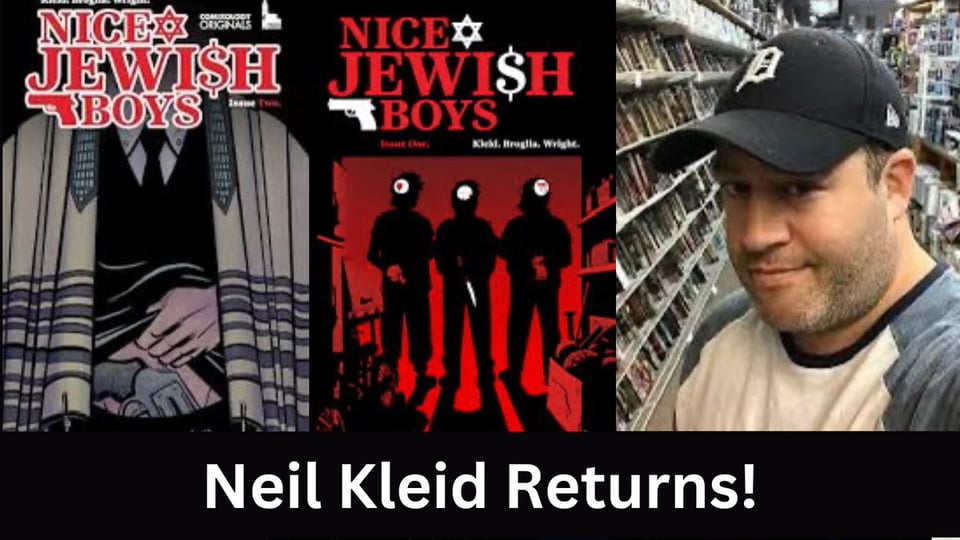
This week I did a fun interview about the series with our pal Jeff Haas at the Traversing the Stars podcast. Give it a look right here.
(Still no word on the print edition, friends, but it looks like we may be close to nailing down some options. I’ll let you know more when I know…)

But while you are anxiously for that news—as you’ve no doubt been anxiously awaiting this latest installment of your favorite newsletter—here’s something great: The Multiversity of Mystery prose anthology was completely funded on Kickstarter!
Thanks to everyone who pledged so we could bring this fun, multiversal Sherlockian romp to life. I’m super excited for you to read my short Holmes ❤️ Watson tale when the book comes out (uh, I guess I better start writing it, yeah?) My story, "Silence of the Empty House", isn’t particularly linked to a specific Holmes story but rather explores the Holmes-Watson relationship from a more intimate perspective...that of, 'what happens when that relationship has come to an end?' As a married man with my own children, I know the pitfalls, grievances, and frustrations that come with any relationship of substance. All partnerships carry levels of intimacy to them, whether that partnership is personal or professional—and that of Holmes and Watson, like quite a lot of relationships of its kind (policemen, homicide detectives, firefighters), at one time blossomed into something more traditional and binding for a time. Now that time is over, the two former partners are looking back on a decade of separation and estrangement as partners in detection...and wedded bliss. This particular tale explores the regrets involved when Holmes and Watson must put aside all that baggage and reunite in America to find their missing adoptive son while answering their greatest mystery of all—can a romance be rekindled after ten years of ire and distance?”
So yeah. The fun stuff. Any way, as I know more about the book’s release to backers, I’ll update you here.
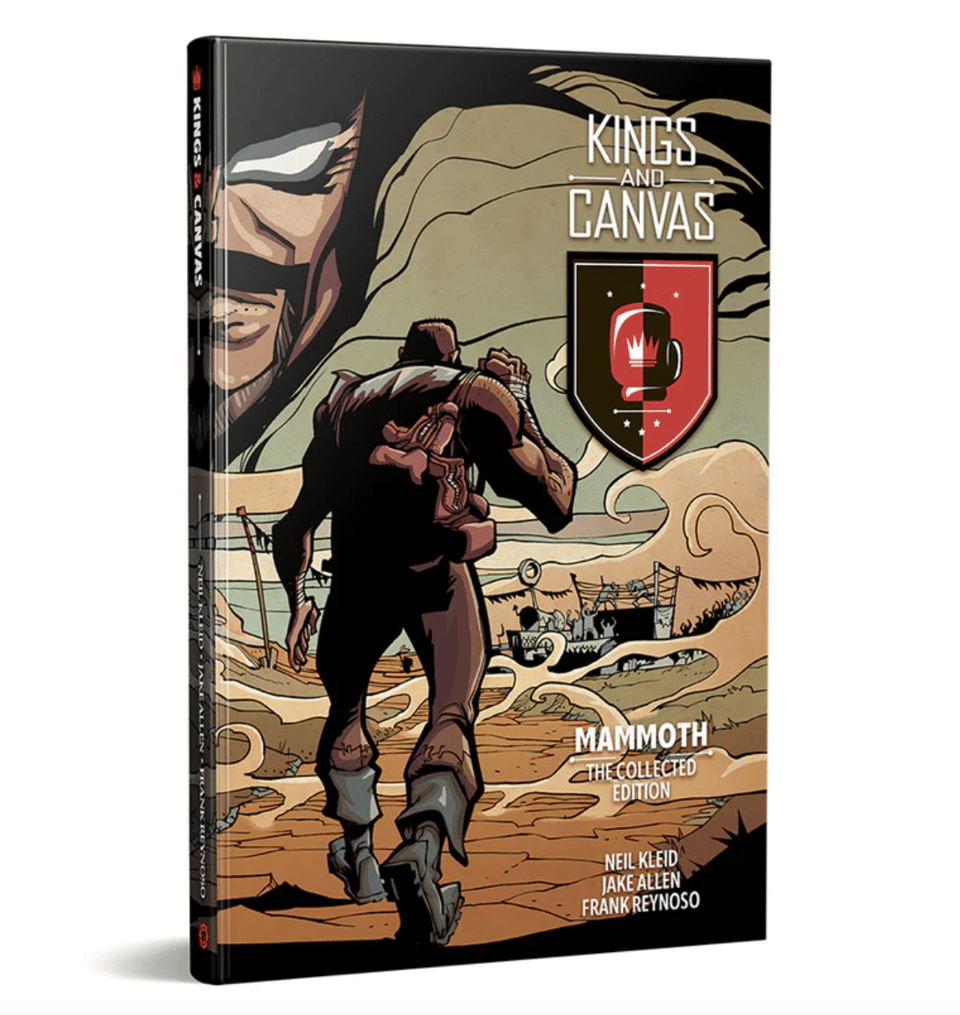
And speaking of crowdfunded books, I hope many of you have already received your copies of Kings and Canvas from me, Jake Allen, Frank Reynoso and Outland Entertainment. I’ve been seeing a few crop up here and there from friends and colleagues on social media, and if you did get yours and have enjoyed it, please feel free to tell me about it here or on the socials. And if you were not lucky to get in on the campaign before it ended, no worries—as luck would have it, you can still purchase copies of the book via the Outland Entertainment website. If you do, make sure to tell them if you like it…and more specifically, tell them if you want to read more of the story!
THE KINDNESS OF BETTER WRITERS
So, as I mentioned, I need to dig in, crack the ol’ knuckles and get that Holmes story written, so that’s my April and May. While I’m doing that, though, I’ll be finishing and polishing the pitch for Project Unwanted, a cool vampire story I’m dying to tell, even though the plot has been…well…tying me up in knots between loving my story and being super frustrated with how it’s coming out and ready to chuck it in the bin.
So what do you do in a case like that, friends?
In my case, I reached out to a pal.
Last year, I was invited to participate in a writer’s group with two old friends and a new one, so we could each share some of our all ages work in progress in service of having other writer’s help poke holes in the narrative or presentation, and offer recommendations and suggestions for how to improve both. A lot of good writers out there are part of a group like this—also, you know, a lot of bad one…but the less said about that the better. In this particular group’s case, all of them were good except for me…and by that I mean, I just didn’t have the bandwidth or headspace to review their work while trying to balance my own, and I felt like I was dragging them down. To that end, I gracefully thanked them and bowed out, wishing them the best of luck (they don’t need it; didn’t you hear me? They are all great).
But when I hit the wall on Project Unwanted, I realized that I was too close to it and needed a second, unbiased eye to tell me whether it was shit or not. And so, an email was sent with just the logline and short overview of the project, and well….
…it isn’t shit, I’ll tell you that much. But it does need work. Work I wouldn’t have known to do—or even seen—if I hadn’t reached out to a friend.
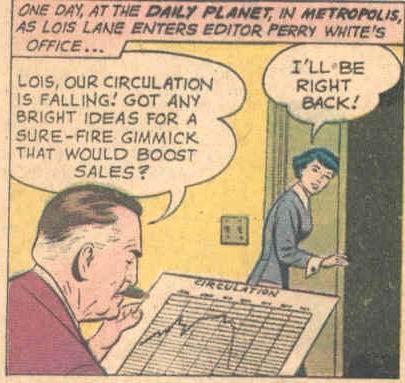
I highly recommend this practice, no matter what kind of art or writing you’ve chosen to undertake. During my career, I have found that if you’re polite, personable, professional and patient…understanding that folks have limits/demands on their time, as well… most folks are eager to help someone pursuing something that they love. You might be asking them to review some writing or art, a design, a contract, a costume, whatever…or you may gently inquire about an introduction to someone who can help an aspect of your career. Or maybe you just need good advice or an answer from a person you like, respect and admire?
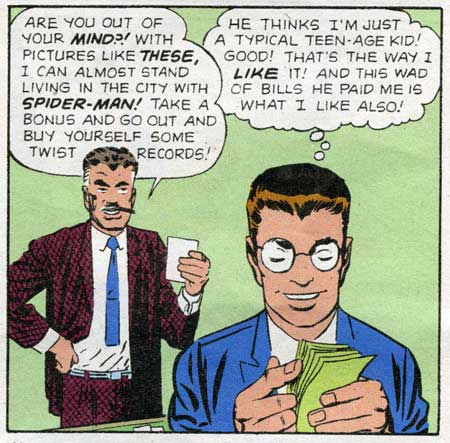
Sometimes a second eye or an unbiased opinion by an individual or creator not close to the work or question can be exceedingly valuable, They’re not hung up by your hangups about whatever it is that’s troubling you, and more willing to help you see toward killing any darlings you’re unwilling to drown—the necessary steps you need to take in order to make the work or situation better and get you moving forward, upward and back toward the peak.
Often, you’ll find that the Second Eye (as we’ll call that individual now, for brevity’s sake) may have encountered the very predicament you’re attempting to solve—or something near to it, or within kissing distance. Then you can benefit from their learned experiences and make them your own. I find this very helpful when it comes to contracts in terms. Personally, I run all of my contracts by a lawyer. But I know that not everyone has access to or can afford a lawyer…but you probably know (especially if you’re in some kind of creative field) someone who has encountered the type of contract that’s confounding you, and can help you parse language or avoid agreeing to terrible decision that may be cleverly couched within.

In my specific case—having a pal review Project Unwanted—the Second Eye keenly pointed out one of my common flaws when it comes to writing a pitch: putting the complicated world-building right up front. I hadn’t clearly noted the protagonists and antagonists, and specified what they wanted, and had instead done a plot-first, world-building intro that hid the real people, their desires, relationships and constraints, all the way at the back half of the overview. Sure, there’s a moment of “oof why did I do that” realization when someone give you solid, unbiased advice like that…along with a heavy sigh of knowing that you’ll need to go back and rewrite something you hoped was finished…
…but ultimately, at the end of the day, the advice helped make the work better. And that’s what a Second Eye is great for—whether they be trusted friend, family, colleague, editor or beta reader. They’re exactly what you need when in moments of narrative or artistic doubt…someone you can give things to—whose tastes, opinions and solutions you know and can trust—and have them approach the work or question with fresh eyes. In some cases, that Second Eye is an expert with valuable knowledge you yourself don’t have (like a lawyer reviewing a contract, or a sensitivity reader/diversity specialist reviewing script or art). In others, it’s just someone you know has dealt with a specific person, place, thing or scenario and you want to make use of their learned experiences. And of course, sometimes you just trust a person to give you honest, usable, professional or personal feedback about something that’s stymied you or, y’know, you need a second opinion about. The Second Eye is great for all of these things, and I highly recommend cultivating a few of these eyes for situations in which you’re stuck, need help, could use a favor or intro, are under qualified or just want to remove doubt.
That being said…
…make sure you know and trust your Second Eye, especially if you’re looking to them for mentorship, partnership or anything beyond a fast question or a quick review. I mean, this week alone we’ve seen where placing trust in a mentor who takes advantage of that trust might lead, and often in a partnership (creators, publishers, producer, agents, etc) there may be incidents where younger creators or folks looking for a leg up or a foot in the door could be vulnerable to getting screwed in the long run. It happens. There are definitely creeps, perverts, slime-balls and predators out there seeking folks desperate for answers, attention or opportunities. Vet your potential mentors, agents, or partners. Talk to other people who may know them, or know folks who know them. It’s sad but true—there are always going to be folks looking to make money off your hard work and ideas, or use enthusiasm and openness as a way to work past your shields and utterly destroy you. Go cautiously; do your homework. You may not catch every creep, perv or shady individual in your bullshit detector, but most of the folks out there seeking to do you harm have probably done it to another…and hopefully someone can warn you away from a Second Eye that can easily turn into an unwelcome fist.
My Second Eye is none of the above. He’s a prince of a guy, and a working writer like myself. I value his taste, insight and opinions, and I believe that he feels the same about me. I have no concern that he’s going to steal my ideas of steer me wrong. I have other Second Eyes out there—for contracts, for design and potential publishers or partners, for editors or all kinds of writing and art I’d like to do. Each and every one of them is either someone that I know personally—a trusted friend or family member, someone with whom I’m worked in the past or has worked with folks I know, love and trust. Each of them wants to help me become a better writer, and though they may not have a financial or professional stake in my career, they have a personal stake in helping ensure that I don’t misstep, that I make the right decisions in both my stories and life, because they value, love and trust me as a Second Eye of their own…and mostly, as a colleague and friend.
Get you a Second Eye (or several) like that, my friends and readers. They’re worth their weight in gold, and will help you —and your work — get to the next level.
MOON KNIGHT: THREE BODY PROBLEM
So, I’ve been reading a lot of Moon Knight comics lately.

I’ll be honest: I was never much of a Moon Knight guy growing up. Sure, he’s now a prominent Jewish Marvel superhero, and despite all the discourse about Oscar Isaac playing the character for Disney+/the MCU (go do a search; I’m staying clear of it), for the early volumes of the hero’s comic—created by Doug Moench and Don Perlin in 1975 as a brightly garbed foil to then-titled darker, moon-adjacent offbeat hero Jack Russell aka Werewolf By Night—ol’ Moony didn’t spend a lot of time digging into his alter ego Marc Spector’s Jewish background. At first, Marc (and of course his—at that point—other identities, playboy Steven Grant and cab driver Jake Lockley) was a mercenary for hire and then a flamboyant hero whose comic, well…never really caught my attention. Not until Moon Knight became a West Coast Avenger in the 1980s, thanks to Steve Englehart, and even then I really didn’t go and check out the back issues of the man’s own comic.
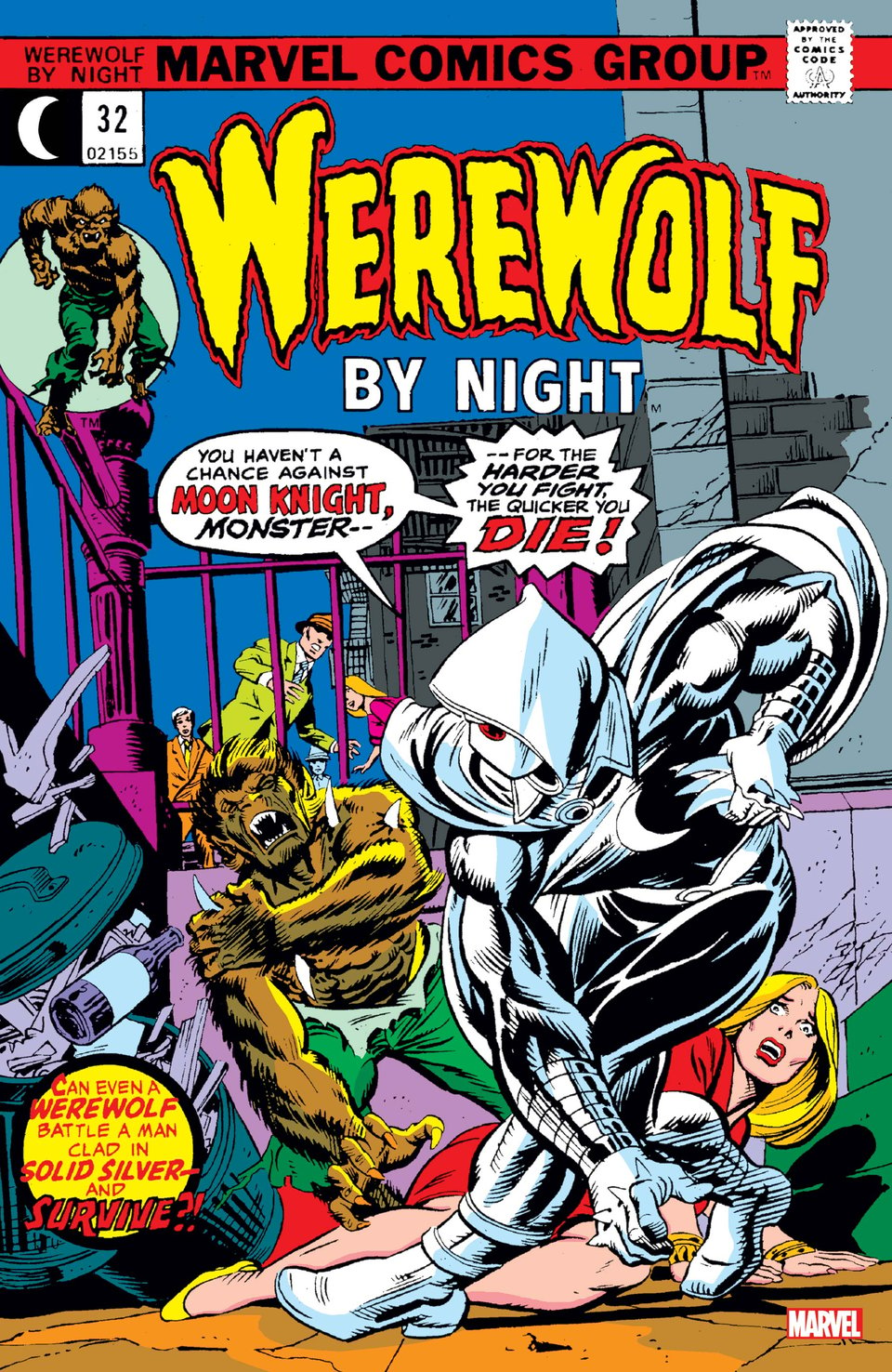
Obviously, the last few years have raised the profile of the old Fist of Khonshu (Moon Knight’s honorific title, as he was resurrected in an Egyptian temple back in ’75 by Khonshu, the god of the moon, protector of travelers, vengeance, and the son of Amon Ra). Marc Spector’s origin and personal history has gone through so many changes and revisions over the years, I’ve honestly lost count. Some say Moony was Marvel's answer to Batman, but I don't buy that and honestly compare him to a different DC Comics superhero—Ragman, AKA Rory Regan, whose earlier appearances by legendary artist Joe Kubert were less supernatural in nature than he recent soul-stealing iterations. Moon Knight's “other identities”—Jake and Steven—have also been revealed to be alter-egos brought about by DID, or dissociative identity disorder, three personalities battling for control of the same body, and both Khonshu’s spiritual and menta meddling over the years have just made things worse—breaking Moon Knight apart, and then back together, abandoning and judging him, and twisting his perception of reality.
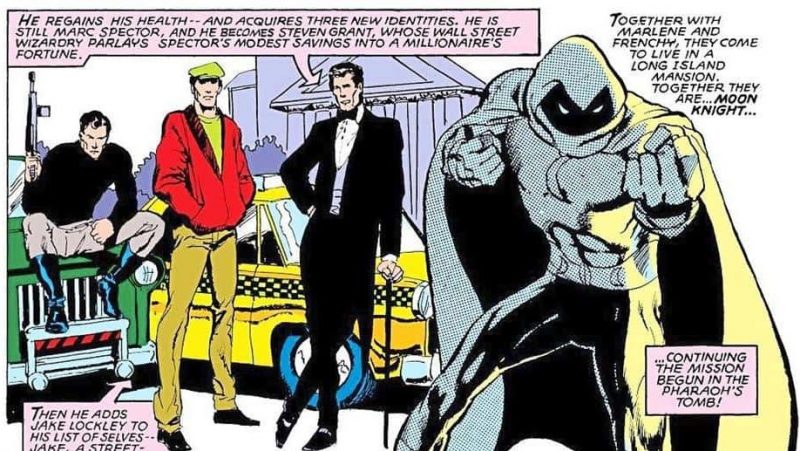
Marc’s Jewish background was brought to the forefront first by writer Alan Zelenetz, and then various writers over the years including (but by no means a comprehensive list) Mike Benson, Jeff Lemire, Brian Bendis and now Jed Mackay. Moon Knight is now “the crazy Avenger” and his alter egos have swelled to include both sharp-suited Mr. Knight (as designed by artist Declan Shalvey, featured on the Disney+ TV series) and also a handful of Marvel heroes, most notably Captain America, Spider-Man and Wolverine.

And his supporting cast has also been reimagined—Marc’s long-time pal and stalwart comrade in arms Jean Paul “Frenchie” Du Champ, his love Marlene Alraune, and street informant Bertrand Crawley—and also swelled to include a self-appointed sidekick named Midnight, a brother Fist of Khonshu in Hunter’s Moon (not to mention a history of past Fists, dating back to prehistoric times), and a loose association of vampires and magicians with whom he builds a “Midnight Mission”, quartered in a living apartment, available for any desperate travelers of the night seeking Moon Knight’s aid.
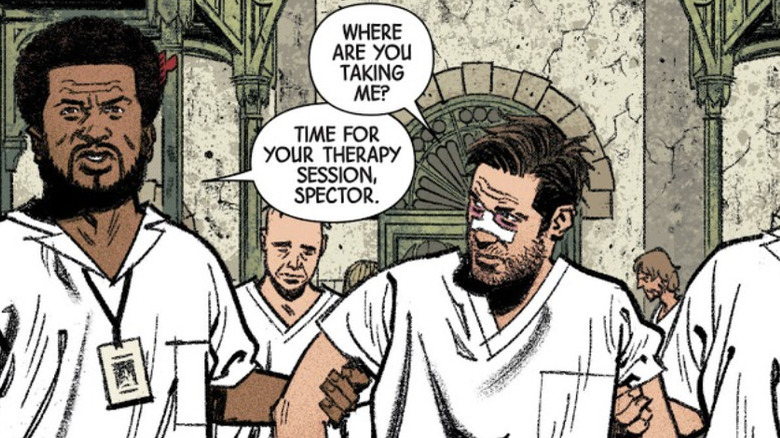
There’s something so compelling to a writer about a hero who is absolutely broken—both physically and mentally—and the opportunities which lay within. Equally so for a writer like me, who not only digs any hint of Jewish representation within his spandex heroes, but actively advocates for the chance to advance that part of the narrative. There are a ton of writers who have managed to tease Moon Knight’s relationship to Judaism—MacKay, every now and then, and recently pal of the newsletter David Pepose tapped at it in both a short story in the anthology Moon Knight: Black, White and Blood, as well as within the pages of a mini-series, City of the Dead. And I haven’t even unpacked the fact that Marc Spector is a Jewish hero whose patron is an Egyptian god! The clashing dichotomy of biblical Judaism and Egyptian mythology…that’s a meal in itself to the right creative team.

Delving deep into the last two decades of Moon Knight comics has absolutely made this Jewish writer a devotee. What better writers and artists have done with Marc, Steven, Jake and their various friends, foes, gods, and associates…how they’ve shattered this lunatic with crescent-shaped throwing knives and a dapper white suit and then…resurrected him again and again, maybe not bringing him back at one hundred percent (or even seventy or eighty percent!) Is absolute tragedy and comedy wrapped into a single, wonderful ongoing adventure story. Each iteration of Khonshu’s fist…every single story about this warped, heartbreaking hero is blunt fucking poetry. There is little responsibility in Moon Knight’s world, and fluctuating levels of power (if any, on some terrible nights). He’s a soldier, sure, but hardly super…and if you thought Bruce Banner was dealing with some awful shit inside his gamma-powered psyche, then I dare you to take a dip inside Marc Spector’s fractured mind—a weapon in itself.
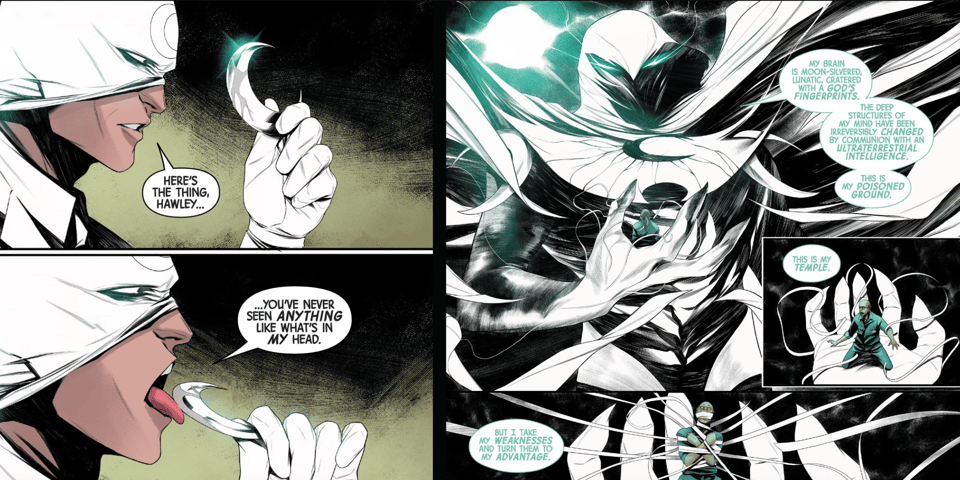
One day, I hope to add my stories to Moon Knight’s fractured, insane character history. In the meantime, if you you’d like to give Moon Knight a chance, here are four Khonshu-adjacent collections I’ve loved and would recommend:
Moon Knight: The Complete Collection by Jeff Lemire and Greg Smallwood
Moon Knight: The Complete Collection by Brian Michael Bendis and Alex Maleev
Avengers: Age of Khonshu by Jason Aaron, Ed McGuiness, Javier Garron and various artists
Moon Knight: City of the Dead by David Pepose and Marcello Ferreira
Moon Knight by Jed MacKay and various artists
WE STAND ALONE
“Men, it's been a long war, it's been a tough war. You've fought bravely, proudly for your country. You're a special group. You've found in one another a bond that exists only in combat, among brothers. You've shared foxholes, held each other in dire moments. You've seen death and suffered together. I'm proud to have served with each and every one of you. You all deserve long and happy lives in peace.”
For years growing up, my Dad urged my brother and I to watch a few movies that he absolutely loved, begging us to watch them with him every chance he got. One of them was Cast A Giant Shadow starring Kirk Douglas about the Haganah after the UN decision to establish the Jewish state, a film I still have not seen to this day. The other film was Once About a Time in America, Sergio Leone’s epic immigrant tale of which I’ve discussed my love in various interviews.
But as I’d mentioned in that interview, it took a long time for me to watch Leone’s masterpiece. Years, in fact, during which I explained to my father that I would never sit down to consume a four hour movie—with an intermission, mind—even if it was about Jewish gangsters and starred Bobby D. No chance in Hell. And then I guess Hell went on a lucky streak, because one day I did watch that thing and now Once About a Time in America is one of my all-time favorite movies ever, to this very egg-on-my-face day.
But now I’m a Dad myself. And convincing my kids to watch the films and TV I’ve enjoyed over the last forty-eight years is one absolute struggle.

Look, some battles are easy—like Star Wars. I mean, who doesn’t like Star Wars? By which I mean, who doesn’t love every single Star Wars movie and TV show ever made, and want to watch them all starting at age six until the age they stop making Star Wars movies and TV show by which we mean never and I’m in my grave after which, I mean, do what you want, kids, but I’d appreciate if you showed all those Star Wars movies and TV shows to my grandkids from the moment that each of them turns six.
But, yeah; I got my kids to watch Star Wars. I also got them to watch all my childhood faves like Ghostbusters, The Goonies, Beetlejuice, The Karate Kid, Back to the Future, Die Hard and more. I convinced one son—my sci-fi G-fan kid— to watch the Lord of The Rings trilogy, as well as every single Godzilla and Jurassic Park/World movies ever made (I mean, he may have convinced me a little, too). I still haven’t broken them into Rocky (we’re close, tho) or The Godfather (too early still), but we’ve watched nearly all the Superman, Batman, Spider-Man and X-Men films, and worked our way around some of my old cartoon loves, like GiJoe, Transformers, Batman: The Animated Series, and the Justice League cartoon. I even convinced them to try Field of Dreams.
Still, some of my favorites are proving to be non-starters. These kids won’t take a crack at Star Trek, nor will they embrace my love of Indiana Jones (they’ve all seen Raiders at my insistence, but that’s where they draw the line) or The Last Starfighter (it might be the terrible 1980s graphics on this one). And as my older boys get, well, older…I have been trying to share with them some of my more recent favorites, like Cobra Kai, Locke and Key, The Good Place, Ted Lasso, and Brooklyn 99, all of which have been slam dunks. And try as I might, despite constantly bringing it up whenever I can…
…my entire family has begged me never to mention HBO’s epic ten-episode WWII mini-series Band of Brothers again.

“What”, you scream? “You can’t be talking about Band of Brothers, the fantastically produced and critically acclaimed television series about the actual paratroopers of Easy Company, part of the 2nd Battalion, 506th Parachute Infantry Regiment the 101st Airborne Division, the actual goddamn heroes who survived the Battle of the Bulge and took Adolf Hitler’s Eagle’s Nest?” Surely, you’ll inquire, I don’t mean the award-winning tour de force, adapted from slapdash historian Stephen Ambrose’s self-same (supposedly often inaccurate) bestseller, an action-packed, deep moving depiction of those beloved soldiers and American heroes as portrayed by a who’s who of Hollywood’s finest, brought to our eager eyes, hearts and mind by no less than E.T.’s dad and Jewish icon Steven Spielberg, and America’s dad, the great Tom Hanks?!
Yes, the very one.

I have been trying and trying to get my wife and older boys to just sit through the damn pilot‚I mean, you’ve got Ross Geller screaming at Donnie Wahlberg from the New Kids and that dude from The Orville all in a single scene! Over there, that’s the DC Comics/Arrowverse’s Damien Dahrk (or the MCU’s “Dum Dum” Dugan, if you prefer) riding in a jeep with Bobby Axelrod from Billions (or Nick Brody from Homeland, if you can remember back that far). I mean, this is a cast of characters, friends…and the story is one of the greatest ever told—a real story about real people who did real things to save our real country, many of who died real, tragic deaths in real battles that took place nearly a century ago.

But maybe that’s the reason for their hesitation, my kids; I mean, it smacks of learning, right? This is ancient history to them. Think about it—for me, when I think of “one hundred years ago”, I put myself in the mind of, I dunno, the Great Depression, Prohibition, that golden age before World War 1. To folks older than me, it goes rather back, right? When someone my age–Get X, in their forties—thinks about history, it sure as hell goes further back than World War Two, right? But to my kids—ages 15, 13, 11 and 9—the year 1944 may feel like the Dark Ages does to me.
So, is that it? Because it’s a time in history that they have only heard about in books or by “old” folks chanting “never forget; never again” on Holocaust Remembrance Day? To my kids, 1984 seems like the Renaissance. So maybe trying to get them to watch ten episodes of paratroopers without cell phones and lasers fighting a bunch of dudes in pointy helmets is a harder sell than I think.
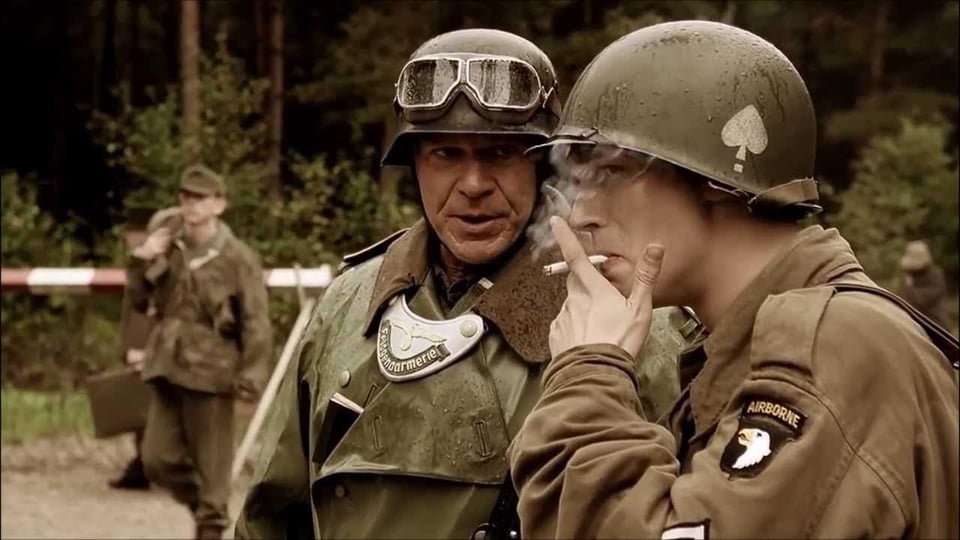
But if only they’d give it a chance, right? I mean, this is a show about relationships and morals, about discipline and fortitude. It’s—I mean, duh—about brotherhood, both on and off the battlefield. It’s about bonds that were forged for a lifetime through battle, and what it meant when you saw friends—actual heroes—fall right damn next to you and have to soldier on, keep moving, keep remembering why you’re there and what it will take to survive.
For those who haven’t seen it (and ask around; don’t let me be the only one to convince you, dear reader), it’s the story about the formation of Easy Company—molded, tested by disciplined and determined officers, some of who were very flawed individuals—and the path they took from an army camp in Georgia overseas to England, and then across the channel to fight in Normandy, Holland, Belgium, the Ardennes, Austria, and Germany. It’s about a constantly changing roster of soldiers and character—some of whom fall and are mourned or sent home; some of whom persevere and are promoted, moving on; still others who ship in and then ship out again—all of whom had earned the right to wear precious wings upon their uniforms and blouse their trousers in their boots…brave men who threw themselves out of airplanes and into battle when the very concept seemed absurd. It’s about heroes and brothers, even though those who survived would have told you the real heroes were those who never made it home, all of them now having joined their ranks.
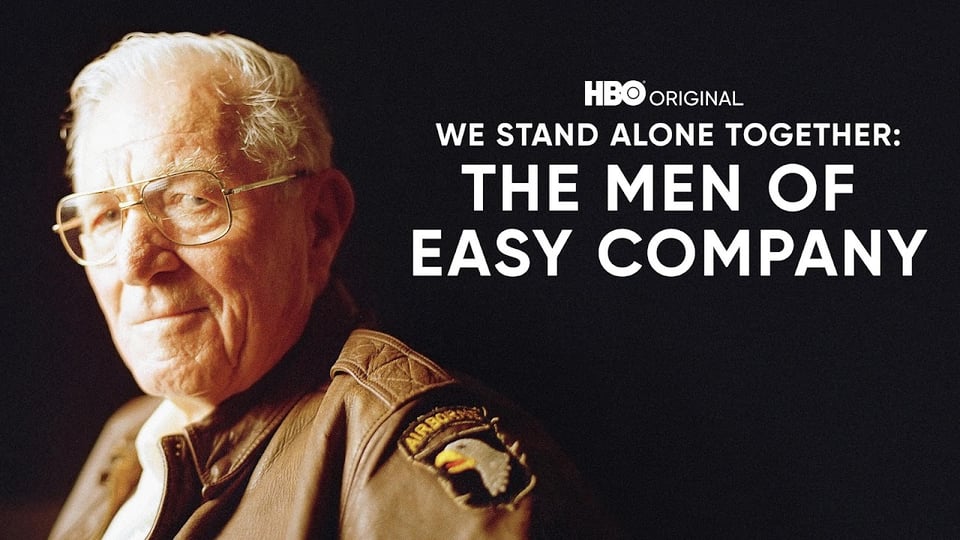
If you really—I mean, really—want to have a good ol’ cry, watch the accompanying documentary titled We Stand Alone Together: The Men of Easy Company. (“We Stand Alone Together” or “Currahee” was the Easy Company motto, Currahee being the name of the hill which dominated the landscape of Camp Toccoa, the basic training camp in Georgia which was the site of Easy’s formation.) The documentary is a series of interviews with the men of Easy Company—the real soldiers, circa 2001, not the actors who portrayed them—and their insights and recollections about the actual events upon which the mini-series is based.
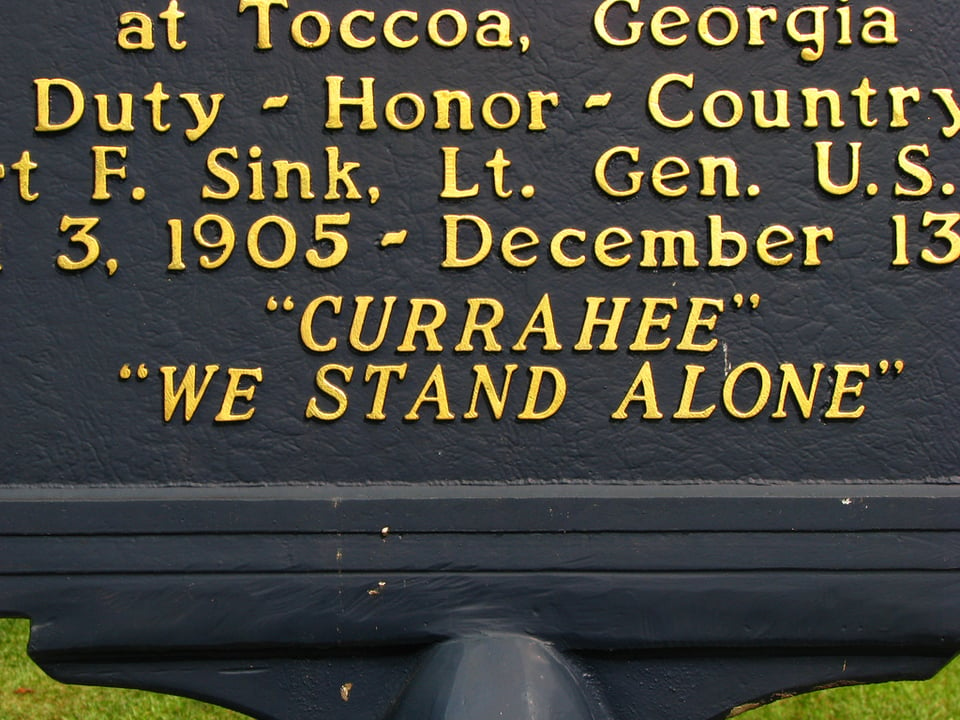
The show itself will make you cry, as well—and smile, laugh, cheer, and put you on the edge of yor seat. The events depicted in the show are not family-friendly…but I believe a necessary reminder of our history, and required viewing for high-school and college aged students learning about said history. My oldest has already been exposed to textbooks, lessons and articles pertaining to WW2, and I think it’s important for him to see as accurate a portrayal as possible (I mean, as accurate as an adaptation of an inaccurate history can possibly be) of what happened in the European Theater of War. Sure; there are critical parts of the war that my kids won’t see in Band of Brothers—both the book and subsequent series focused on Easy, for the most part made up of white American soldiers, the majority of which hailed from the East Coast, the Midwest, and (for some reason) Pennsylvania. There’s a lot more to World War Two than what my kids would see in these ten episodes, and I will always encourage them to learn as much as they can about the Tuskegee Airmen, the Blitz, Anne Frank, the Siege of Leningrad, the struggle for North Africa and so much more.
But for now, right here, I can start them with this. With a series I enjoyed, an ensemble cast like no other, and a group of heroes that will hopefully never be forgotten.
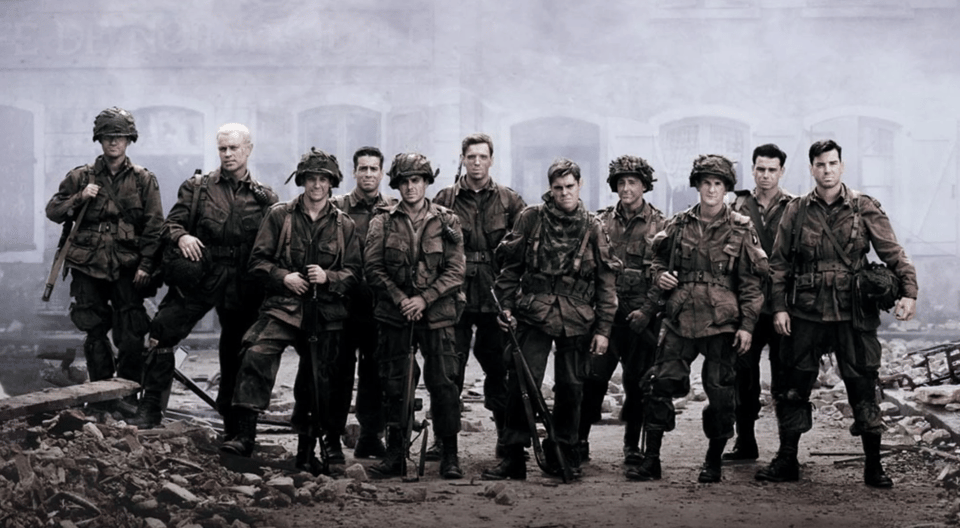
If interested, Band of Brothers is available on the HBO Max and also now on Netflix.
BACK TO THE WRITING, I GUESS
Not a bad installment, right? Lots of words from Neil. Next time, I think we’ll give you an entire comic you may have never seen. How’s that grab you? For now, I’ma get back to breaking apart that Project Unwanted pitch and kicking my Holmes story into gear.
In the meantime, go vote for Nice Jewish Boys in this year’s Ringo Awards, would you? We’d really appreciate it, friends.
See you in the baseball season, folks. Don’t take any wooden hamentaschen.
—Neil